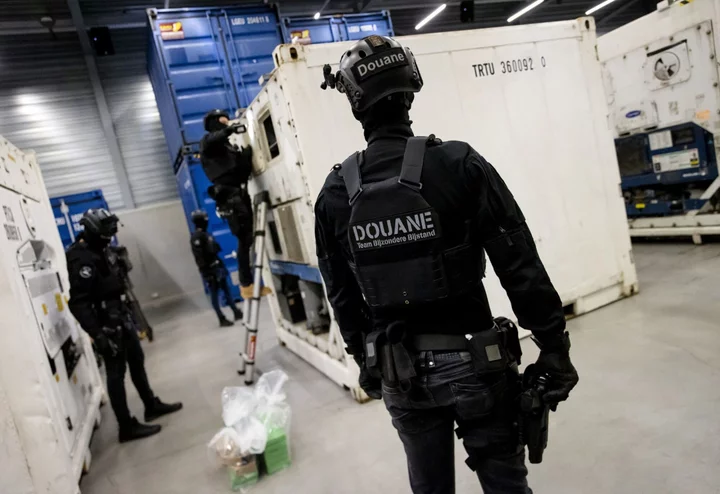A fintech owner in London is facing allegations that he helped notorious drug traffickers attempt to launder hundreds of millions of euros through a crypto exchange platform on a scale rarely seen by European prosecutors.
Authorities in Belgium are seeking the extradition of Caio Marchesani from the UK as part of their effort to dismantle a transnational gang. They accuse the 38-year-old Italian of “knowingly and intentionally” hoarding piles of cash for Sergio Roberto De Carvalho, a Brazilian described by Interpol as one of the world’s most wanted kingpins before his arrest in 2022, and managing crypto accounts on behalf of Flor Bressers, a Belgian national known as the “finger cutter,” who was also nabbed last year.
Marchesani owns Trans-Fast Remittance, a payments business regulated by the Financial Conduct Authority. He was arrested in May at Heathrow Airport.
The case puts the British financial-technology scene under fresh scrutiny amid fears that its weak controls are enabling the movement of illicit funds around the world. Transparency International UK has called for tougher supervision after finding that more than one-third of UK-licensed electronic-money institutions show red flags. In response to Bloomberg queries, the FCA said it is “engaging” with Trans-Fast “as part of our ongoing supervisory work, including in relation to these matters.”
The Belgian investigation kicked off three years ago after Dutch customs officials seized more than 12 tonnes of cocaine, worth more than €260 million ($283 million), from containers at Europe’s busiest port, Rotterdam. Authorities traced the haul to Bressers and De Carvalho, later zeroing in on Marchesani after a breakthrough in decoding encrypted communications.
In all, 33 suspects have been identified, linked to countries including Brazil, Hungary, the Czech Republic, and France — five are in pretrial detention, with Bressers and De Carvalho in Belgium and Marchesani in the UK.
The case against Marchesani came to light at a series of extradition hearings in London. A request for bail was turned down by the court after prosecutors described him as a flight risk. The judge intends to rule on the extradition later in September.
‘Large Cash Sums’
Marchesani managed 14 Binance accounts for Bressers, according to Belgian prosecutors. He also held cash for De Carvalho, charging suspiciously high rates of as much as 9% for transferring funds, the prosecutors said.
As many as 85% of Trans-Fast customers were Brazilian, filings from a separate employment case show. A recorded company telephone message says it is currently offline and unable to process orders.
The underground network is alleged to have essentially combined new technology with hawala, a centuries-old money transfer system practiced in regions including the Middle East, where international and local remittances are paid largely based on trust. Its use of crypto currencies increased after the Covid pandemic made cash deliveries much harder, according to Belgium prosecutors. Binance provided law enforcement with “practical operational assistance” in relation to the investigation, a spokesperson for the crypto-trading platform said.
Amanda Bostock, a lawyer acting for Belgium authorities, described Marchesani as “a dark banker who receives money and moves it around at the will of the criminal organization in order to disguise its origins.”
“Very large cash sums” protected by a round-the-clock guard were said to have been stored at an apartment Marchesani rented near the US embassy in south London, prosecutors said. He was found with some £1.5 million ($1.9 million) of cryptoassets. The electronic wallet holding them was subsequently frozen.
Marchesani’s lawyers deny the allegations. The money for Marchesani’s bail surety had legitimate origins from a UK company with a “thriving business focused on healthy eating in a cafe setting,” the judge said in a reference to Acai Berry Foods Ltd. of which Marchesani is the chief financial officer and a 50% shareholder. The prosecution’s case has “false, vague, ambiguous or inaccurate particulars,” his lawyers at Mishcon de Reya said. “What is clear however, is that none of the allegations against him relate to any of his business interests in the UK.”
Marchesani, who interned at Deutsche Bank from October 2013 to January 2014, wanted to convert Trans-Fast into an online bank according the employment case tribunal ruling. Companies House filings from August show another owner added to the registry.
‘Everything is Criminal’
In an encrypted chat decoded by authorities, Marchesani, using the moniker ‘Greysmith,’ asked, “friend, this ted 60 is for crime or normal?” to which ‘Lucrativeherb’, a pseudonym prosecutors say was used by De Carvalho, replied, “Normal. Everything is criminal,” the Belgian law enforcers alleged. The judgment did not mention what ‘ted 60’ referred to. In another message, Marchesani is alleged to have said: “only risk is when the police are around.”
Bressers, who has a masters in criminology, was wanted on charges including kidnapping, gang drug trafficking and theft, and was arrested in February 2022 in Zurich. De Carvalho was nabbed in Hungary in June 2022 and transferred to Belgium by the air force earlier this summer. He was subject of an Interpol Red Notice, with countries including Brazil demanding his extradition for drug trafficking, money laundering, forging documents and murder in connection with organized crime.
The Belgian prosecutor said in a July letter to the UK, that nearly all the evidence has been collected and that she aimed to conclude the probe in early September. She said she’d already decided the case will go to a full criminal trial. A spokesperson confirmed the letter and declined to comment.
In London, Marchesani’s lawyers said they planned a further challenge to his extradition because investigators were presenting different cases at different moments. If convicted, Marchesani faces a maximum sentence of five years imprisonment in Belgium, a country his lawyers say he’s never visited.
--With assistance from Stephanie Bodoni, Donal Griffin and Sarah Jacob.
(Corrects to say that Marchesani isn’t accused of converting cash into crypto in the sub heading and the second paragraph.)

